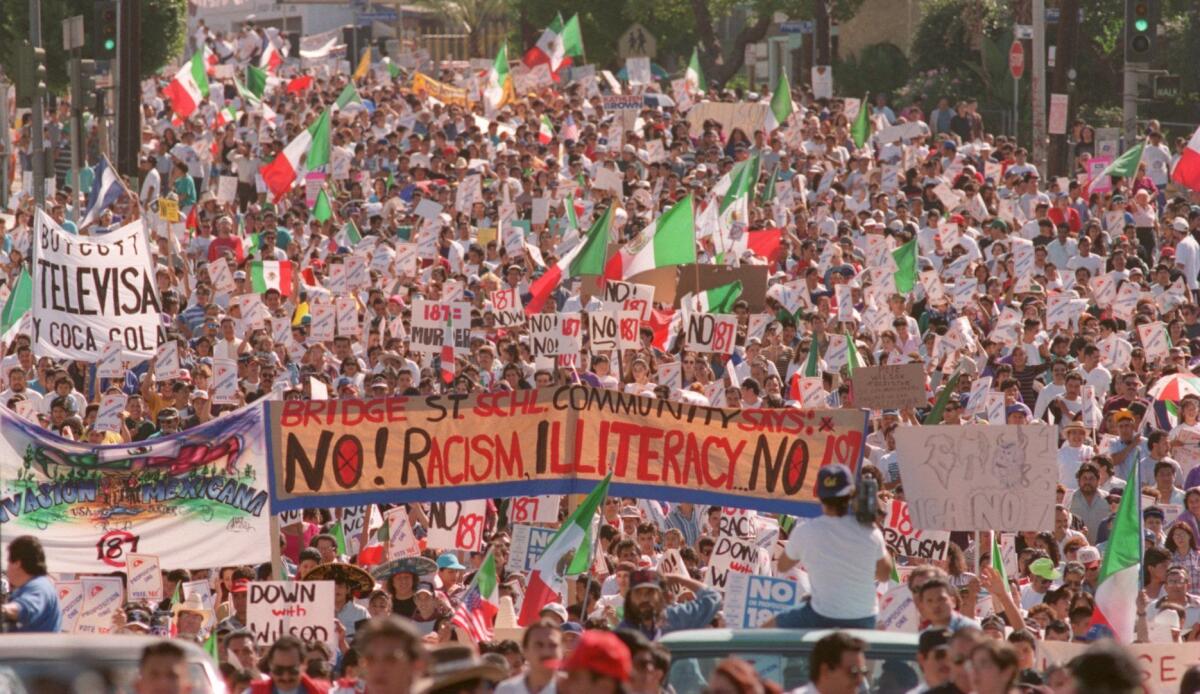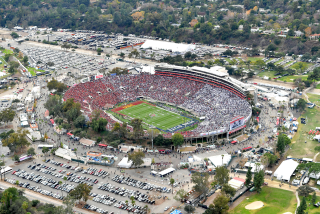Op-Ed: 1994 in the Rose Bowl -- when soccer met Prop. 187

It’s no coincidence that we’re observing the 20th anniversaries of the last time the World Cup was played in the United States and of the passage of Proposition 187, the initiative enacted by California voters to withhold public services to anyone in the country illegally. In fact, they are inextricably connected. The days when “the world came to the Rose Bowl” for soccer helped fuel the xenophobic backlash that ensured passage of the controversial measure with nearly 60% of the vote.
With the U.S. team advancing further in the World Cup this year than many had expected, global soccer has finally gone mainstream in America. However, in 1994, the audience for the finals in Pasadena was largely confined to international visitors, American Youth Soccer Organization families and immigrants from nations where soccer is as central to national identity as football is to the United States.
In June of that year, on the eve of World Cup competition, nearly 100,000 fans crowded into the Rose Bowl to watch an exhibition game featuring the United States’ team and Mexico’s national team. The vast majority of the friendly fans were rooting for the Mexican team. I was there, and the Rose Bowl was awash in red, white and green Mexican flags.
It was not a stellar year for the Mexican team. It fell to the U.S., 1-0, in that match, then lost three games and did not make it to the quarterfinals of the World Cup. But those waving Mexican flags would play a crucial role in how the debate over Proposition 187 played out.
The anti-immigrant initiative was a poorly drafted product of a fringe group. The petition drive was launched by an unemployed accountant, who claimed he’d been cheated in a business deal by an illegal immigrant (from Canada), and a former police crime analyst who said she was galvanized by a visit to a social services agency where she walked into “this monstrous room full of people, babies and little children all over the place, and I realized nobody was speaking English.”
Proposition 187 would never had qualified for the ballot without the brazen opportunism of then-Gov. Pete Wilson. Trailing challenger Kathleen Brown in early polls during his reelection campaign, Wilson threw his support behind the measure.
At the time, California had taken a hard fall in the final days of the George H.W. Bush administration. A real estate bubble had burst, and the end of the Cold War brought devastation to the local aerospace industry. The riots over the verdict in the Rodney King beating case, gang violence and a series of natural disasters cast a long shadow over the California dream. Voters were in an angry mood, and whether their hostility would focus on the incumbent Republican governor or faceless Mexican immigrants was an open question.
Wilson, an otherwise bland moderate, calculated that the numbers were on his side if voters were pitted against disenfranchised immigrants. He ignored the outrage over the initiative from religious and civic leaders, and the overwhelming verdict of newspaper editorial writers.
Brown courageously staked her campaign on opposing Proposition 187. Yet if there was any hope of turning the tide, it disappeared when thousands of angry Latino students took to the streets in protest. They were carrying hundreds of Mexican flags (and a scattering of American ones). The Mexican tricolors were branded by proponents of 187 as indelible proof that these youths constituted a foreign invasion.
Of course, I believe most of those flags had been acquired months before by soccer fans, not die-hard Mexican nationalists. Voters reacted viscerally to a misinterpreted symbol. Their emotions were manipulated by the political agenda of supposed patriots. Wilson and his far-right allies waved the American flag while they turned their back on the Statue of Liberty. Nowadays, immigration reform rallies are flooded with U.S. flags, carried by those seeking overdue equal justice.
California is a different state today. You can wear a colorful soccer jersey, wave a flag and cheer for Brazil, Italy or Mexico without censure — unless they are playing the American squad. The world has come back to the land of the Rose Bowl, and this time it’s genuinely welcome.
Rick Cole, deputy mayor for budget and innovation for the city of Los Angeles, was mayor of Pasadena in 1994.
More to Read
Start your day right
Sign up for Essential California for news, features and recommendations from the L.A. Times and beyond in your inbox six days a week.
You may occasionally receive promotional content from the Los Angeles Times.






